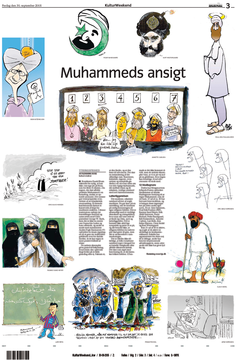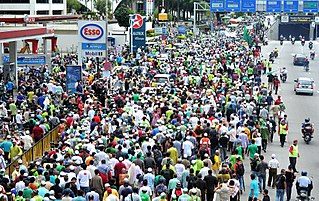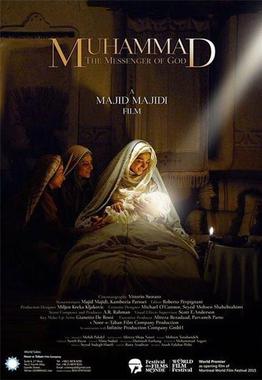The depiction of the Islamic prophet Muhammad is a controversial topic both within and outside of Islam. Although the Quran does not explicitly forbid images of Muhammad, there are a few hadith which have explicitly prohibited Muslims from creating visual depictions of figures. Because the different branches of Islam use different Hadith collections, there is a split on this issue between the two major denominations of Islam, Sunni and Shia Islam.
The Jyllands-Posten Muhammad cartoons were first published by Jyllands-Posten in late September 2005; approximately two weeks later, nearly 3,500 people demonstrated peacefully in Copenhagen. In November, several European newspapers re-published the images, triggering more protests.

The Jyllands-Posten Muhammad cartoons controversy began after the Danish newspaper Jyllands-Posten published twelve editorial cartoons on 30 September 2005 depicting Muhammad, the leader of Islam, in what it said was a response to the debate over criticism of Islam and self-censorship. Muslim groups in Denmark complained, sparking protests around the world, including violence and riots in some Muslim countries.

In Islam, blasphemy is impious utterance or action concerning God, but is broader than in normal English usage, including not only the mocking or vilifying of attributes of Islam but denying any of the fundamental beliefs of the religion. Examples include denying that the Quran was divinely revealed, the Prophethood of one of the Islamic prophets, insulting an angel, or maintaining God had a son.
Censorship of video-sharing platform YouTube occurs to varying degrees in many countries.
The international reaction to Fitna consisted of condemnation from Muslims, several fatwa against Geert Wilders, and attempts by many Islamic countries to censor the film. The Dutch government immediately distanced itself from the film. Several Muslim organizations and political parties organized boycotts against Dutch products.

Everybody Draw Mohammed Day was a 2010 event in support of artists threatened with violence for drawing representations of the Islamic prophet Muhammad. It stemmed from a protest against censorship of the American television show South Park episode "201", led by the show's distributor Comedy Central, in response to death threats that had been made against some of those responsible for two segments broadcast in April 2010. A drawing representing Muhammad was posted on the Internet on April 20, 2010, with a message suggesting that "everybody" create a drawing depicting Muhammad on May 20 in support of free speech.

Terry Jones is an American anti-Islamic right-wing activist, who was the pastor of Dove World Outreach Center, a small nondenominational Christian church located, until July 2013, in Gainesville, Florida. He is the president of a political group, Stand Up America Now. He first gained national and international attention in 2010 for his plan to burn Qur'ans, the scripture of the Islamic religion, on the ninth anniversary of the September 11 attacks and for burning the Qur'an afterward.

Islamic teachings and argument have sometimes been used to censor opinions and writings throughout history, and there are many cases of censorship in Islamic societies.
Innocence of Muslims is a 2012 anti-Islamic short film that was written and produced by Nakoula Basseley Nakoula. Two versions of the 14-minute video were uploaded to YouTube in July 2012, under the titles "The Real Life of Muhammad" and "Muhammad Movie Trailer". Videos dubbed in Arabic were uploaded during early September 2012. Anti-Islamic content had been added in post-production by dubbing, without the actors' knowledge.

The release of the anti-Islamic short film Innocence of Muslims triggered numerous demonstrations across North Africa, the Middle East and South Asia. On September 11, 2012, dozens of protestors scaled the walls and entered the courtyard of the U.S. embassy in Cairo, Egypt. On September 13, 2012, protests occurred at the U.S. embassy in Sanaa, Yemen, resulting in the deaths of four protesters and injuries to thirty-five protesters and guards. On September 14, the U.S. consulate in Chennai was attacked, resulting in injuries to twenty-five protesters. Protesters in Tunis, Tunisia, climbed the U.S. embassy walls and set trees on fire. At least four people were killed and forty-six injured during protests in Tunis on September 15. Further protests were held at U.S. diplomatic missions and other locations in the days following the initial attacks. Related protests and attacks resulted in numerous deaths and injuries across the Middle East, Africa, Pakistan, and Afghanistan.
Mark Basseley Youssef, formerly known as Nakoula Basseley Nakoula, is an Egyptian-American writer, producer, and promoter of Innocence of Muslims, a film which was critical of Islam and the Islamic prophet Muhammad.
Morris Sadek is a Coptic-American lawyer and activist who reportedly brought YouTube video Innocence of Muslims to the attention of the Arabic-speaking world, where it was denounced by protesters at American embassies and consulates.

Members of the Islamic militant group Ansar al-Sharia carried out a coordinated attack against two United States government facilities in Benghazi, Libya on September 11, 2012. At 9:40 p.m. local time, members of Ansar al-Sharia attacked the American diplomatic compound in Benghazi resulting in the deaths of both United States Ambassador to Libya J. Christopher Stevens and U.S. Foreign Service Information Management Officer Sean Smith. At around 4:00 a.m. on September 12, the group launched a mortar attack against a CIA annex approximately one mile (1.6 km) away, killing two CIA contractors Tyrone S. Woods and Glen Doherty and wounding ten others. Initial analysis by the CIA, repeated by top government officials, indicated that the attack spontaneously arose from a protest. Subsequent investigations showed that the attack was premeditated—although rioters and looters not originally part of the group may have joined in after the attacks began.

On 15 September 2012, a protest against the anti-Islamic film Innocence of Muslims was held in Sydney, New South Wales. While the protest started peacefully, violent confrontations between police and protesters began when protesters reached the United States Consulate General. In resulting clashes, six police officers and 19 protesters were injured. The violence was condemned by Australian political leaders, including Prime Minister Julia Gillard. Police arrested nine protesters in connection with the violence.
This article covers the chronology of the reactions to Innocence of Muslims. The uploading of the Innocence of Muslims films trailer resulted in protests, deaths and hundreds of injuries in several cities in the world.
Following the 2012 diplomatic missions attacks that began on September 11, 2012, many nations and public officials released statements. Widespread early news coverage said that the protests were a spontaneous response to an online preview of Innocence of Muslims, a movie considered offensive to Muslims. Later consideration of the Libya attack's complexity, of statements made by some Libyan officials, and of the potentially symbolic date fueled speculation of preplanned efforts. U.S. missions in Cairo, Egypt, and Benghazi, Libya, were attacked during the first day of the protest.

Garcia v. Google, Inc., 786 F.3d 733, is an ongoing dispute that arose when Cindy Lee Garcia sued Google and its video-sharing website, YouTube, to have the controversial film, Innocence of Muslims, taken down from the site. A California district court denied Garcia's motion for preliminary injunction, but, on appeal, a panel of the United States Court of Appeals for the Ninth Circuit reversed the lower court's decision, ordered YouTube to take down all copies of Innocence of Muslims, and remanded the case to the district court for reconsideration. In May 2015, in an en banc opinion, the Ninth Circuit reversed the panel's decision, vacating the order for the preliminary injunction.

Muhammad: The Messenger of God is a 2015 Iranian Islamic epic film directed by Majid Majidi and co-written with Kambuzia Partovi. Set in the sixth century, the plot revolves around the childhood of the Islamic prophet Muhammad.
Aalmi Tehreek-e-Namoos-e-Risalat is Barelvi organization and Islamic religious movement based in Europe and Pakistan. It was founded by Muhammad Alauddin Siddiqui 2012 in London.









